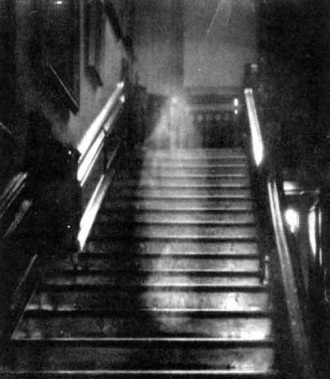Andy Weeks
Do you believe in ghosts?

Click the picture to read a history of this famous photo.
According to one public survey, the number of people who believe in some kind of paranormal activity is on the rise. Three in every four people believe in paranormal, according to a June 16, 2005 Gallup poll. Thirty-seven percent of responders said they believe houses can be haunted. (The number was slightly higher, 40 percent, for Britons; and lower 28 percent, for Canadians.) An interesting number, since 32 percent said they believe a dead person could come back from the Great Beyond amid certain places and situations. The poll also found that 31 percent believe in telepathy, 26 percent in clairvoyance, 21 percent believe that people can communicate mentally with someone who has died, and 21 percent believe in witches. Extra-sensory perception, or ESP, received the most supporters at 41 percent.
Five months later, in November of the same year, Gallup published a follow-up with additional information about its previous findings. “Women [42 percent] are more likely than men [31 percent] to believe in haunted houses, communicating with the dead, and astrology,” reads the poll. “Men, on the other hand, show a slightly greater proclivity than women to believe in extraterrestrial beings.” There’s even a group among the younger crowd who said they believe in the paranormal. A nationally representative survey of more than 3,000 teenagers, for instance, said they are open to believing in astrology, psychics and communicating with the dead, according to the National Study of Youth and Religion.
These polls were taken years ago, but more recent polls show much the same thing. In 2019, for instance, Ipsos, a market research company, found that 46% of Americans said they believe in the paranormal. A third of them, or 32%, said they believe that aliens visit the earth.
How people view the afterlife varies from one person to the next and from faith to faith. Some Christians regard the Bible’s teachings about the afterlife as infallible: “And it is appointed unto men once to die,” Paul wrote to the Hebrews, “but after this the judgment.” (Hebrews 9:27.) Others, some who also profess belief in the Bible, possess a more liberal view. A journalist friend of mine reported in an October 31, 2009 newspaper article: “As reality-TV programs such as ‘Ghost Hunters’ or Discovery Channel’s ‘Ghost Lab’ continue to grow in popularity, concepts of the afterlife are moving into the realm of tangible documentation and other scientific theories, and there are those who find a balance. For them, the venture into the dark of night with a video camera and a flashlight could stand to affirm their faith that there is life after death.”
What’s your answer to the question: Do you believe in ghosts? Take the quick survey below.
Five months later, in November of the same year, Gallup published a follow-up with additional information about its previous findings. “Women [42 percent] are more likely than men [31 percent] to believe in haunted houses, communicating with the dead, and astrology,” reads the poll. “Men, on the other hand, show a slightly greater proclivity than women to believe in extraterrestrial beings.” There’s even a group among the younger crowd who said they believe in the paranormal. A nationally representative survey of more than 3,000 teenagers, for instance, said they are open to believing in astrology, psychics and communicating with the dead, according to the National Study of Youth and Religion.
These polls were taken years ago, but more recent polls show much the same thing. In 2019, for instance, Ipsos, a market research company, found that 46% of Americans said they believe in the paranormal. A third of them, or 32%, said they believe that aliens visit the earth.
How people view the afterlife varies from one person to the next and from faith to faith. Some Christians regard the Bible’s teachings about the afterlife as infallible: “And it is appointed unto men once to die,” Paul wrote to the Hebrews, “but after this the judgment.” (Hebrews 9:27.) Others, some who also profess belief in the Bible, possess a more liberal view. A journalist friend of mine reported in an October 31, 2009 newspaper article: “As reality-TV programs such as ‘Ghost Hunters’ or Discovery Channel’s ‘Ghost Lab’ continue to grow in popularity, concepts of the afterlife are moving into the realm of tangible documentation and other scientific theories, and there are those who find a balance. For them, the venture into the dark of night with a video camera and a flashlight could stand to affirm their faith that there is life after death.”
What’s your answer to the question: Do you believe in ghosts? Take the quick survey below.
All content on this site is copyrighted 2016-2024 ANDY WEEKS